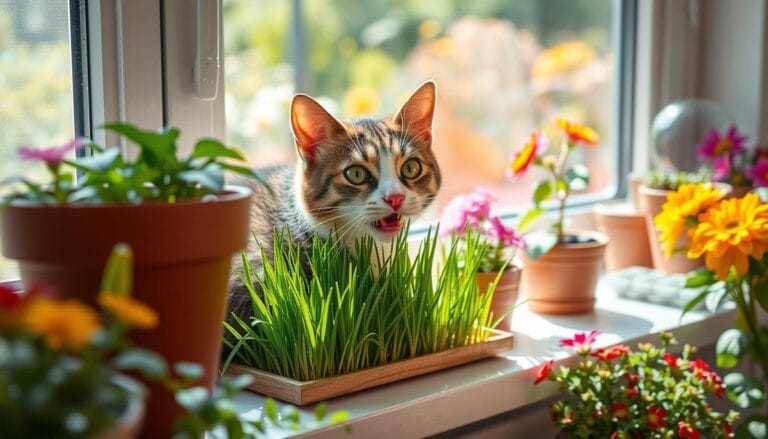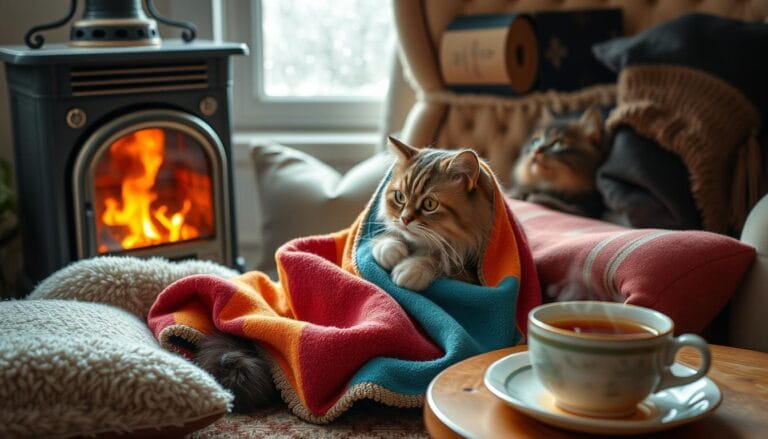Coughing Cat: Best Home Remedies for a Healthy Kitty
Cats can cough for many reasons, like colds, allergies, hairballs, or asthma. It’s important to know why your cat is coughing. As a cat owner, you can help by finding the cause and taking steps to help your cat. If your cat keeps coughing, it’s important to see a vet. This could mean there’s a bigger health problem.
Did you know allergies can make cats sneeze and have clear eye discharge? This can lead to coughing. You can help your cat feel better with home remedies like steam therapy, natural anti-inflammatory solutions, and changing their diet. These can all help a coughing cat.
Table of Contents
Knowing why your cat coughs and using the right home remedies can help them feel better. If your cat’s cough is bad, brings up phlegm, or lasts more than a few days, see a vet. This is important to make sure your cat is okay.
Key Takeaways
- Identify the underlying causes of coughing in your cat to provide the best care for your coughing cat.
- Seek veterinary care if your cat’s cough persists or is severe, as it may be a sign of an underlying health issue affecting your feline coughing.
- Use home remedies such as humidity and steam therapy, natural anti-inflammatory solutions, and dietary modifications to alleviate your cat’s cough and help your coughing cat.
- Keep your cat’s nose and eyes clean to reduce coughing related to colds or allergies, which is essential for a coughing cat.
- Provide a warm and comfortable environment for your cat to recover, which is vital for a cat coughing.
- Consider using probiotics and Vitamin C to support your cat’s immune system, specially when your cat is coughing.
Understanding Why Your Cat Is Coughing
Cat sneezing and coughing can worry cat owners. If your cat is coughing, knowing the possible causes is key. Coughing can be a natural response to irritation or a sign of a bigger issue.
Different Types of Cat Coughs
Cats can cough in different ways, like dry, wet, or coughs with phlegm. A wheezing cough might mean asthma or other breathing problems. Knowing the type of cough helps figure out the cause.
Common Causes of Feline Coughing
Many things can make cats cough, like infections, allergies, hairballs, and asthma. If your cat is coughing and sneezing, it might have an upper respiratory infection. A long-lasting cough could mean asthma or a parasitic infection.

When Coughing Signals an Emergency
In some cases, coughing is a big warning sign. If your cat has trouble breathing, blue gums, or a constant cough, get vet help fast. Knowing when to act quickly is vital for your cat’s health.
Signs Your Coughing Cat Needs Immediate Veterinary Care
As a cat owner, it’s key to know when your As a cat owner, it’s key to know when your
needs help. Cats coughing can mean they’re sick, and quick action is important. Look out for signs like trouble breathing, blue gums, a long cough, and coughing up blood or yellow or green stuff.
If your cat shows these symptoms, get them to the vet fast. The vet will check them over, ask about their health history, and might do tests like X-rays or bronchoscopy. This helps find out why they’re coughing. Sometimes, cats coughing can mean serious problems like asthma or heartworms, which need quick treatment.
Some important signs that mean your coughing cat needs vet care right away include:
- Difficulty breathing
- Blue-tinged gums
- Persistent cough
- Coughing up blood or yellow or green phlegm
If you see any of these signs, don’t wait. Get your coughing cat to the vet quickly. Quick action is key to help your cat feel better.
Natural Home Remedies for a Coughing Cat
Seeing your cat cough can be upsetting. It might be due to colds, allergies, hairballs, or even heartworms. Luckily, there are natural ways to help your cat feel better.
Humidity and steam can help your cat’s breathing. You can use a humidifier or make a steamy bathroom. This makes it easier for your cat to breathe.
Humidity and Steam Therapy
Other natural remedies can also help. Adding honey to your cat’s food can soothe their cough. Herbal teas like chamomile or peppermint can calm their breathing.
Natural Anti-inflammatory Solutions
Changing your cat’s diet can also help. Soft, wet food is easier to eat when they’re sick. Adding probiotics and Vitamin C supports their immune system.
Trying these natural remedies can help your cat feel better. But, if their cough lasts or gets worse, see a vet.
Creating a Comfortable Environment for Recovery
When your coughing cat is sick, making a cozy space for them to recover is key. This means a warm, quiet spot with food, water, and litter nearby. This setup helps your cat relax and lowers stress, speeding up their recovery.

It’s important to keep your cat’s water fresh always. Also, watch how much they eat and drink. Sick cats might not want to eat or drink, which can lead to dehydration. Try giving them small meals often to keep their energy up.
Here are more tips for a comfy recovery space for your cats coughing:
- Provide a clean, comfy place to rest
- Keep stress and noise down
- Feed them a balanced, nutritious diet
- Make sure litter is accessible and clean
By following these tips, you can help your coughing cat feel better and return to their usual self. Always follow your vet’s advice during this time.
Essential Oils and Aromatherapy: What’s Safe for Your Cat
When thinking about using essential oils and aromatherapy for your cat’s cough, it’s key to know what’s safe. Cats can easily get sick from essential oils because their livers work differently. Some oils can irritate their lungs, so be careful, even more so if your cat wheezes.
Some essential oils are bad for cats, like oil of wintergreen and citrus oil. These can make cats drool, vomit, and have trouble breathing. If your cat gets into these oils, get vet help fast. Make sure your cat’s space is safe and free from harmful oils if they sneeze and cough.
Safe Essential Oil Options
Not all essential oils are bad for cats. Some might be okay in small amounts and the right setting. But, always check with a vet before using any oils or scents around your cat. Safe oils can help your cat feel better and make their space cozy.
Application Methods
Using essential oils safely around your cat is important. You might use a diffuser or put a little oil on their bedding or toys. Always mix oils with a carrier oil and use them sparingly to avoid harm. This is best for cats with sneezing and coughing issues.
Preventive Measures to Avoid Future Coughing Episodes
As a cat owner, you are key in stopping future coughing episodes in your pet. A coughing cat might show a health problem. Taking early steps can lower the chance of feline coughing becoming a long-term issue.
To keep your cat healthy and stop coughing, try these steps:
- Keep your cat’s vaccinations current to fight off diseases.
- Feed a balanced diet that fits your cat’s needs.
- Reduce stress by making a peaceful home.
Working with your vet for the best care can stop future coughing. Regular vet visits and a healthy life can make your cat happy and well.
Understanding the Link Between Diet and Respiratory Health
When you care for your cat, knowing how diet affects their health is key. Cats coughing can signal a bigger issue, and their food might make it better or worse. A balanced diet full of nutrients is vital for their health, including their breathing.
The right foods can greatly help with cat coughing. Foods high in omega-3 fatty acids can lessen airway inflammation. Also, foods packed with antioxidants protect your cat’s lungs from harm.
Best Foods for Respiratory Health
- Fish-based diets, which are high in omega-3 fatty acids
- Diets rich in antioxidants, such as vitamin E and beta-carotene
- Diets with balanced fatty acid profiles to reduce inflammation
Supplements can also boost your cat’s breathing health. But, always talk to your vet before adding them to your cat’s diet. Together, you can find the best nutrition and supplements to ease cat coughing and improve their breathing.
Environmental Triggers That Cause Cat Coughing
As a cat owner, you want to keep your pet safe and healthy. But, there are things in the environment that can make your cat cough. These include allergens, dust, and pollution, which can make breathing harder for cats. Studies show that about 20%-30% of cats cough because of these irritants.
To protect your cat, you should vacuum daily. This can cut down allergens and irritants in your home by 50%. Also, using different litters like corn or pine pellets can reduce irritation by about 30% compared to clay litter.
Some common things that can make your cat cough include:
- Dust and pollen
- Chemical cleaners and air fresheners
- Clay-based litter
- Second-hand smoke
Knowing about these triggers and reducing your cat’s exposure can help. This way, you can prevent your cat from coughing and keep them happy and healthy.
Holistic Approaches to Feline Respiratory Health
As a cat owner, you want the best for your pet, including their respiratory health. If your cat is coughing, it’s key to look at all options. Holistic methods can be a great addition to traditional care, helping many cats feel better.
Traditional Chinese Medicine
Traditional Chinese medicine views feline health differently. It aims to balance the body’s energy, or “qi,” to aid healing. Herbal formulas like San Ren Tang are used to manage cat asthma.
Acupressure Points
Acupressure is a holistic technique that can ease a cat’s cough. Applying gentle pressure to certain body points can calm the respiratory system and lessen stress.
Herbal Remedies
Herbal remedies, like those in traditional Chinese medicine, support respiratory health. They can reduce inflammation and ease cough symptoms. Some cat owners also use CBD oil to balance their cat’s immune system and reduce inflammation.
Exploring holistic approaches can make your cat more comfortable and cut down on coughing. Always talk to your vet before trying new therapies, even if your cat is already getting traditional treatment.
When Home Remedies Aren’t Enough: Professional Treatment Options
As a cat owner, knowing when to seek professional help is key. If your coughing cat doesn’t get better with home remedies, it’s time to see a vet. Vets say a cough that lasts more than a few days might mean a serious issue.
Look out for signs like coughing up phlegm, severe coughing, or coughing that keeps coming back. If you see these, it’s time to talk to your vet. They can suggest treatments like antibiotics or anti-inflammatory meds to help your cat feel better.
Some infections, like feline upper respiratory infections, can really hurt your cat’s health. With a high infection rate in some places, taking your cat’s cough seriously is important. Getting professional help can ensure your cat gets the care they need to recover fully.
Your vet might suggest treatments like N-Acetylcysteine to clear nasal secretions. They might also recommend a “three in one” vaccine to protect against common viruses. Working with your vet can help your coughing cat get better and prevent future coughing episodes.
Maintaining Your Cat’s Overall Respiratory Wellness
To keep your cat’s respiratory system healthy, it’s key to have daily health routines. Watch your cat’s behavior for signs of cat sneezing and coughing. These signs might mean there’s a problem. Regular vet visits can catch issues early, preventing serious problems like cat wheezing cough.
Some daily health routines to think about include:
- Providing a balanced diet that supports respiratory health
- Ensuring your cat stays hydrated by giving plenty of fresh water
- Creating a comfortable and stress-free environment
Seasonal factors also play a role in your cat’s respiratory health. For example, holiday air fresheners can make cat sneezing and coughing worse. Being aware of these factors and taking steps can help keep your cat’s respiratory system healthy. This reduces the chance of cat wheezing cough.
Conclusion: Supporting Your Cat’s Recovery Journey
As you help your cat through their coughing, remember they can get better. Give them a comfy place to rest, try natural remedies, and work with your vet. This way, your coughing cat can feel better and avoid future breathing problems.
Cats coughing is a common issue, but finding the cause is key. Watch for any signs of trouble and get help when needed. With care, patience, and a whole-body approach, you can help your cat recover and stay healthy.
FAQ
What are the different types of cat coughs?
Cats can have different kinds of coughs. There’s a dry, hacking cough, a wet, productive cough, and a wheezing cough. Knowing the types can help you figure out what’s wrong and how to fix it.
What are the common causes of feline coughing?
Feline coughing can come from many things. It might be due to respiratory infections, allergies, asthma, foreign objects, or even heart disease. It’s important to get your vet’s help to find out why your cat is coughing and how to treat it.
When should I seek immediate veterinary care for my coughing cat?
If your cat is having trouble breathing, has blue-tinged gums, or keeps coughing, get vet help right away. These signs mean something serious might be wrong and needs quick attention.
What are some natural home remedies for a coughing cat?
For a coughing cat, you can try a humidifier to add moisture. You can also use natural anti-inflammatory stuff like honey or turmeric. Changing your cat’s diet to include foods that help their breathing can also help.
How can I create a comfortable environment for my cat’s recovery?
Make a warm, quiet spot for your cat with easy access to food, water, and litter. This will help them feel better and recover faster.
What essential oils are safe for cats, and how should they be used?
Lavender, frankincense, and chamomile are safe for cats. But use them carefully and only with your vet’s okay. Cats can be sensitive to oils, so it’s important to use them right and avoid bad ones.
What preventive measures can I take to avoid future coughing episodes in my cat?
To stop coughing in the future, keep your cat’s breathing healthy with daily care. Deal with environmental triggers and work with your vet to make sure your cat’s diet and supplements help their breathing.
How can a cat’s diet and supplements affect their respiratory health?
Feed your cat foods rich in nutrients that help breathing, like omega-3s and antioxidants. Some supplements, like probiotics or omega-3s, can also help under your vet’s advice.
What environmental triggers can cause cat coughing?
Things like dust, pollen, smoke, and strong smells can make cats cough. Knowing these and keeping your cat away from them can help prevent coughing.
What holistic approaches can be used to support feline respiratory health?
For breathing health, you can try traditional Chinese medicine, acupressure, and herbal remedies. These can be used along with vet care, but only with a qualified expert’s help.
When do home remedies not work, and professional treatment is necessary?
If your cat’s cough doesn’t get better with home remedies, or if they seem really sick or in distress, get vet help. Your vet can find out what’s wrong and treat it to keep your cat healthy.
There are no reviews yet. Be the first one to write one.







